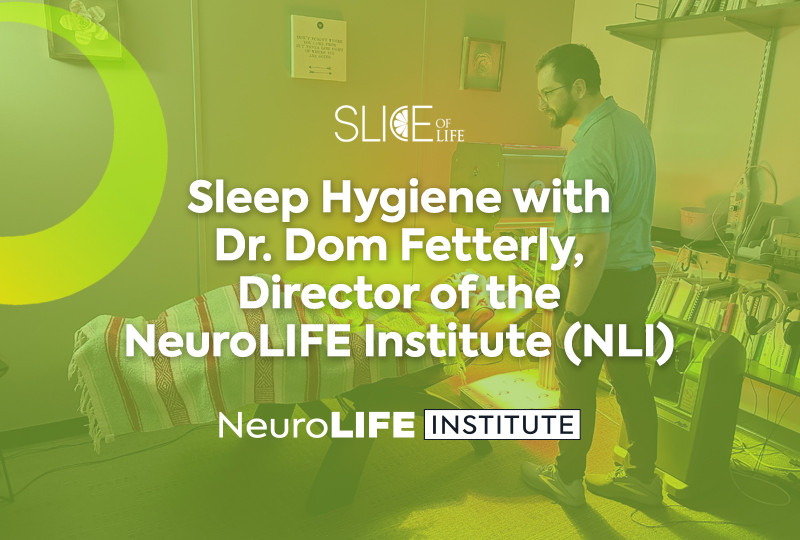What is Sleep Hygiene?
“Hygiene is a form of taking care of something. When you think dental hygiene, it often refers to, you floss a number of times, you go to the dentist for a checkup a number of times. Sleep hygiene is how well you take care of your sleep routine. With that, how well do we take care of our brains so they can sleep and recover well so that they can heal better? Often the cases and the folks we see here at NeuroLIFE Institute (NLI) – they’re in a position where optimal healing needs to come from any avenue that we can find. Sleep is often a controllable factor and often worthwhile endeavor to explore with patients,” explained Dr. Dom Fetterly, Director of NLI.
Many people don’t realize just how important a good night’s sleep is to their long-term health. The inability to sleep well and getting inadequate amounts of sleep is something many of us suffer with. According to Dr. Fetterly, being able to sleep restfully is often a controllable factor. Once we learn the steps to take and plan, like everything else we do in life, restful sleep becomes easier to achieve.
As part of the initial intake with patients at NLI, Dr. Fetterly always asks “How are you sleeping?”; “Did you sleep well?”; “Are you getting an adequate amount of sleep?”; and “Are you feeling rested when you wake up?” The conversation continues from a patient’s answers from these four simple questions, because many times, peoples’ responses reveal they didn’t get good rest.
“If we don’t feel rested when we wake up, it sets us up for not being able to optimally heal going forward. Often with inadequate sleep, it puts us in positions where our stressors are even a little bit more stressful than usual,” explained Dr. Fetterly. “There are some studies that support 18 hours of being awake as being the equivalent of having a blood alcohol content of 0.05. The legal driving limit is 0.08. Even having a small discrepancy in sleep, we significantly impair our body’s ability to navigate through the world. If we extend that a little longer, there’s some research to suggest that if we stay awake for 24 straight hours, it’s the equivalent of our blood alcohol content of our brain operating at a 0.10 B.A.C. We would get pulled over and be arrested if we were given a sobriety test of being awake for 24 straight hours! Our brain does not do well in deprived sleep states.”
Most research shows that seven to nine hours is considered the proper amount of sleep, shared Dr. Fetterly. When a patient tells him that they operate just fine on less sleep, he explains to them the importance of creating healthy routines for sleep.
“When we think about the short term, yes, you can make it for now, but the long term is like squishing your brain like a sponge and extracting the resources,” said Dr. Fetterly. “When we sleep, it allows for us the ability to activate a cleaning system within our nervous system called the glymphatic system. This allows us to replenish and heal our neurons. If we’re not sleeping enough, we don’t activate this system. In turn, we don’t activate or access what’s considered deep sleep or REM sleep, which is also very replenishing and healing.”
Dr. Fetterly will then work with the patient on calming therapies in the NLI. Out of the office, he offers them skills to build good habits for sleep. He teaches them the 10-3-2-1 rule. Ten hours before bed, don’t drink caffeine; three hours before bed, try not to consume alcohol or food; two hours before bed, try not to work or doing anything that causes stress or is mentally taxing; and one hour before bed, lose the electronics.
“It puts us in a situation where we allow for our brain to start unloading and allowing for a power down process. Just as the sun rises and goes down, when the sun rises, we activate systems in our brain that say, ‘time to wake up, time to have energy.’ When the sun goes down, we also have a process that drives melatonin, a naturally occurring substance in our body that makes us sleepy,” explained Dr. Fetterly.
It is like a dance between cortisol and melatonin, creating a pattern of waking up and going to sleep. We influence both of these by what we do throughout our day. There are calming exercises that each of us can do to help navigate this dance to gain a better night’s sleep. Doing side-to-side eye movements helps us work with our parasympathetic nervous system, and the staff at NLI may also use vibration on the face to activate the same brain regions that activate the parasympathetic nervous system. Of course, the chiropractic adjustment is essential to optimize nervous system function and a great night’s sleep.
“I view sleep as a function of the brain and the nervous system. I ask people about sleep so that I can learn more about the brain and the nervous system and its ability to heal. Often we’re able to influence sleep in a beneficial factor for patients to continue their healing journey,” said Dr. Fetterly.
Click this NLI link for more information about the NeuroLIFE Institute and how we can help you in your health journey.
If you or someone you know would love to learn about becoming a chiropractor, please click this link about Life Leadership weekend (LLW) to come visit us at Life U today!


Social Media